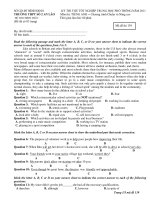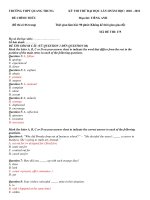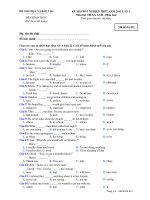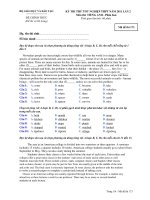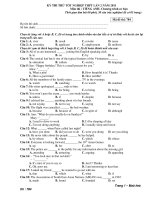KỲ THI THỬ TN-THPT NĂM 2011 Môn thi: Tiếng Anh (mã đề 621-Hệ 7năm) docx
Bạn đang xem bản rút gọn của tài liệu. Xem và tải ngay bản đầy đủ của tài liệu tại đây (94.86 KB, 9 trang )
KỲ THI THỬ TN-THPT NĂM 2011
Môn thi: Tiếng Anh (mã đề 621-Hệ 7năm)
Đọc kỹ đoạn văn sau và chọn phương án đúng (ứng với A hoặc B, C, D) cho mỗi câu từ 1 đến
5.
A combination of water, salt, air pollution, sun, sand, and wind is destroying the huge statue just
outside Cairo. This five-thousand-year-old statue, which has the body of a lion and the face of a
human being, is too badly damaged to be completely saved. First, there is not a good drainage
system around the statue and too much water has been running into the stone statue for several
years. As a result, tiny pieces of salt have been left on the stone and have damaged it. Second, air
pollution from the increasing amount of traffic in Cairo is also destroying the ancient statue. The
air is so full of poisonous gases that it is damaging the statue even faster. Third, the statue is
being destroyed by extremes of temperature. The air is very cold at night, but during the day the
stone of the statue becomes very hot under the strong sunlight. Other natural forces such as
severe sandstorms attack the statue as well. Finally, the tourists who visit the statue every day
also cause a lot of damage to it.
Câu 1: Which of the following is NOT true about the statue?
A. It is in the centre of Cairo.
B. It is very big.
C. It is badly damaged.
D. Part of it looks like a person.
Câu 2: According to the passage, the statue was built______.
A. in the 10
th
century.
B. 500 years ago.
C. 5,000 years ago.
D. in the 5
th
century.
Câu 3: All of the following are mentioned as causes of damage to the statue EXCEPT______.
A. fires
B. tourists
C. temperature
D. air pollution
Câu 4: The word “ancient” in the passage mostly means______.
A. beautiful
B. very big
C. very old
D. modern
Câu 5: It can be inferred from the text that______.
A. tiny pieces of salt have been put on the statue to prevent damage
B. there is little damage to the statue
C. human beings as well as nature cause much damage to the statue
D. the statue was built for entertainment many years ago
Chọn từ/ cụm từ thích hợp (ứng với A hoặc B, C, D) để hoàn thành mỗi câu sau.
Câu 6: Linda: “Excuse me! Where’s the post office?”
Maria: “______.”
A. Don’t worry
B. It’s over there
C. Yes, I think so
D. I’m afraid not
Câu 7: My sister is very fond______ eating chocolate candy.
A. about
B. at
C. with
D. of
Câu 8: She’ll be a billionaire by the time she______ forty.
A. was
B. will be
C. is
D. is going to be
Câu 9: Alice: “What shall we do this evening?”
Carol: “______”
A. No problem
B. Let’s go out for dinner
C. Oh, that’s good
D. I went out for dinner
Câu 10: “Would you like to have______ coffee?”
A. many
B. few
C. some
D. little
Câu 11: I’m going to have my house______ this weekend.
A. redecorates
B. redecorate
C. redecorating
D. redecorated
Câu 12: Paul was______ disappointed with his examination results that he was sad all week.
A. such
B. too
C. enough
D. so
Câu 13: He ______ in London at the moment.
A. is studying
B. studies
C. will study
D. has studied
Câu 14: ______ I came to see her yesterday, she was reading a magazine.
A. When
B. Before
C. After
D. While
Câu 15: It’s difficult to______ what our lives would be like without music.
A. expect
B. imagine
C. remember
D. see
Câu 16: Helen: “Where do you come from?”
Ann: “______.”
A. In London
B. Yes, I have just come here
C. I’m living in London
D. I come from London
Câu 17: If the weather______ worse, we won’t go to the beach.
A. would get
B. gets
C. will get
D. got
Câu 18: You can buy dairy______ in this shop.
A. producers
B. production
C. productivity
D. products
Câu 19: After drinking a big bottle of______, he got drunk.
A. milk
B. orange juice
C. water
D. liquor
Câu 20: The teacher told his students______ laughing.
A. to stop
B. stop
C. stopping
D. stopped
Câu 21: Helen: “Congratulations!”
Jane: “______”
A. What a pity!
B. You are welcome
C. Thank you
D. I’m sorry
Câu 22: ______ I were you, I would take a taxi to the airport.
A. If
B. Unless
C. Because
D. When
Câu 23: I wish I ______ a car. I’m tired of catching the bus to work every day.
A. will have
B. had
C. have
D. had had
Câu 24: Tom: “How did you get here?”
John: “______”
A. I came here by train.
B. I came here last night.
C. The train is so crowded.
D. Is it far from here?
Câu 25: Miss White sang very______ at my birthday party last night.
A. beautifully
B. beautify
C. beauty
D. beautiful
Câu 26: By this time next year, my father______ here for 25 years.
A. will be working
B. will work
C. will have been working
D. are going to work
Câu 27: Hoi An is a famous tourist______.
A. attraction
B. attract
C. attracted
D. attractive
Câu 28: The boy______ eyes are brown is my friend.
A. who
B. which
C. whom
D. whose
Câu 29: I’m learning English______ I want to get a better job.
A. or
B. because
C. therefore
D. but
Câu 30: When my father was young, he ______ get up early to do the gardening.
A. was used to
B. use to
C. got used to
D. used to
Đọc kỹ đoạn văn sau và chọn phương án đúng (ứng với A hoặc B, C, D) cho mỗi chỗ trống từ
31 đến 35.
There are a lot of things you should follow to be a welcome guest in America. When you are (31)
_____ to have dinner at your friend's house, it's necessary to bring a small present. Flowers are
always nice; or you may bring a bottle of (32) _____ if you know that your friend likes drinking.
You are expected to arrive for dinner on time or just a few minutes late. Don't get there early. If
you are going to be more than fifteen minutes late, you should call and tell them.
Try to relax and enjoy yourself at the dinner table. If you don't know about choosing the (33)
_____ fork or knife, just watch the other people, and follow them. If you still have no idea of
(34) _____ to do, ask the person next to you.
When it comes to the food, if you like it, say so. They are looking forward to hearing your
compliments. Of course, you will thank them for the meal and for their kindness. It is also a good
idea to send a (35) _____ note the day after.
Câu 31: A. forced
B. invited
C. demanded
D. made
Câu 32: A. Coke
B. juice
C. wine
D. lemonade
Câu 33: A. new
B. right
C. main
D. big
Câu 34: A. what
B. where
C. which
D. why
Câu 35: A. message
B. thank−you
C. welcome
D. goodbye
Chọn từ (ứng với A hoặc B, C, D) có phần gạch dưới được phát âm khác với những từ còn lại
trong mỗi câu sau.
Câu 36: A. fields
B. vehicles
C. farmers
D. crops
Câu 37: A. rained
B. followed
C. believed
D. stopped
Câu 38: A. town
B. slow
C. power
D. how
Câu 39: A. think
B. this
C. those
D. there
Câu 40: A. instead
B. leader
C. deafness
D. headache
Chọn phương án (A hoặc B, C, D) ứng với từ / cụm từ có gạch dưới cần phải sửa để các câu
sau trở thành chính xác.
Câu 41: He has made a lot of mistakes in his writing because his carlessness.
A B C D
Câu 42: Peter earned a large number of money last year.
A B C D
Câu 43: He never goes home before he will finish his work.
A B C D
Câu 44: You have to study hard to keep pace in your classmates.
A B C D
Câu 45: Mr. Smith is going to buy a new Japanese car, doesn't he?
A B C D
Chọn phương án đúng (ứng với A, B, C hoặc D) để hoàn thành mỗi câu sau.
Câu 46: Take your money with you ______.
A. if you see any good souvenirs to buy
B. when you see any good souvenirs to buy
C. whenever you see any good souvenirs to buy
D. in case you see any good souvenirs to buy
Câu 47: The doctor advised Robert ______ to lose weight.
A. that he takes more exercise
B. that he should take more exercise in order that
C. to take more exercise if he wanted
D. to take more exercise so that he could
Câu 48: When you arrived back at the hotel, ______ ?
A. did you notice what time it was
B. did you notice what time was it
C. were you noticing what time it was
D. were you noticing what time was it
Câu 49: The road is _______.
A. so slippery for us to drive fast
B. too slippery for us to drive fast
C. so slippery that we drove fast
D. too slippery that we can't drive fast
Câu 50: Alexander Fleming, _____, received the Nobel Prize in 1945.
A. who discovered penicillin
B. he discovered penicillin
C. that discovered penicillin
D. which discovered penicillin
ĐÁP ÁN ĐỀ NGHỊ
1. A 26. C
2. C 27. A
3. A 28. D
4. C 29. B
5. C 30. D
6. B 31. B
7. D 32. C
8. C 33. B
9. B 34. A
10. C 35. B
11. D 36. D
12. D 37. D
13. A 38. B
14. A 39. A
15. B 40. B
16. D 41 D
17. B 42 C
18. D 43 C
19. D 44 C
20. A 45 D
21. C 46 D
22. A 47 C
23. B 48 A
24. A 49 B
25. A 50 A

